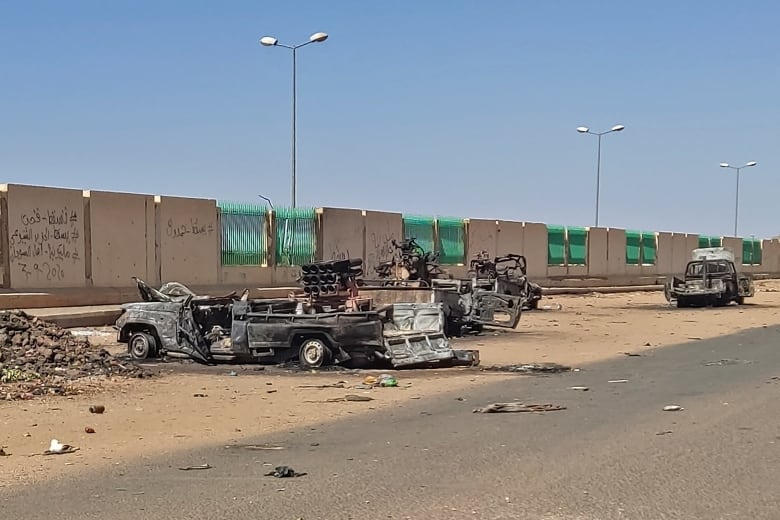Terrified Sudanese who have been trapped for days in their homes by fighting in the capital of Khartoum fled on Wednesday, as the military and its paramilitary rival made a new attempt at a 24-hour ceasefire after a failed truce the day before.
The new ceasefire attempt came as alarm was growing that millions of Sudanese were on the brink of disaster from the past five days of warfare between the country’s two most powerful generals.
The fighting grew less intense in the first hours after the ceasefire took effect at 6 p.m. local time, with sporadic clashes continuing in the city centre, said Atiya Abdalla Atiya, secretary of the Doctors’ Syndicate.
But he said neither side has provided guarantees to his group to facilitate movement of health-care workers and ambulances.
Desperate residents of the capital have been running out of food and other supplies as they sheltered in their homes from the gun battles, bombardment and airstrikes on the streets outside.
Hospitals have been damaged and forced to close or have been overwhelmed by wounded, with staff exhausted and medical supplies depleted.
Increasingly, armed fighters have turned to looting shops and robbing anyone who dares step outside.
Nearly 300 people have been killed in the past five days, the UN health agency said, but the toll is likely higher because many bodies lie uncollected in the streets.
After the failure of Tuesday evening’s truce attempt, hundreds gave up on trying to hold out for calm and fled their homes throughout the day Wednesday, even as explosions and gunfire shook Khartoum and the adjacent city of Omdurman.
Residents of multiple neighbourhoods told The Associated Press they could see men, women and children leaving with luggage, some on foot, others crowding into vehicles.
Sporadic shooting, explosions
On Wednesday evening, the army and its rivals, the paramilitary Rapid Support Forces (RSF), separately announced that a new 24-hour truce had begun.
Prospects for the ceasefire were uncertain, as residents continued to hear sporadic shooting and explosions.
White House press secretary Karine Jean-Pierre called for both sides to stand by a truce, “renounce violence and return to negotiations.”

She said the army and the RSF “are responsible for ensuring the protections of civilians and non-combatants.”
Until now, army chief Gen. Abdel Fattah Burhan, and RSF commander Gen. Mohammed Hamdan Dagalo — former allies against Sudan’s pro-democracy movement — seem determined to crush each other in their struggle for power.
The explosion of violence between their forces, which began Saturday, has challenged international efforts to bring calm.
Fighting near military headquarters
Throughout the day Wednesday, the two sides battled around the main military headquarters in central Khartoum, which the RSF has tried repeatedly to capture, and the nearby airport.
Residents said the military was pounding RSF positions with airstrikes.

The army’s monopoly on air power has appeared to give it an edge in fighting in Khartoum and Omdurman, enabling it to take several RSF bases over the past few days.
But tens of thousands of fighters from the paramilitary force are fanned out across neighbourhoods.
Residents say armed men, mostly in RSF uniforms, have raided homes, offices and shops in neighbourhoods across Khartoum.
Both sides in the conflict have a long history of human rights abuses.
The RSF was born out of the Janjaweed militias, which were accused of widespread atrocities when the government deployed them to put down a rebellion in Sudan’s western Darfur region in the early 2000s.
Darfur has also seen heavy clashes in the past five days.
The aid group Doctors Without Borders said armed men raided its compound in Nyala in Darfur, stealing vehicles and office equipment and looting a warehouse storing medical supplies.
The International Committee of the Red Cross (ICRC) said its office in Nyala was also looted, with one vehicle taken.
Foreigners, including diplomats and aid workers, have also been trapped by the fighting.
Medical supplies running out
Hospitals in Khartoum are running dangerously low on medical supplies, often operating without power and clean water, the ICRC said in a statement.
Dozens of health-care facilities in Khartoum and around the country have stopped functioning because they are close to clashes, the Sudanese Doctors’ Syndicate said Wednesday. At least nine hospitals were bombed, it said.
“Our urgent priority is to get medical assistance to hospitals and try to make repairs to their water and power lines so they can treat the wounded,” said Patrick Youssef, the ICRC’s Africa regional director.
But fighting has made it impossible to reach the facilities.
The UN’s World Health Organization said Wednesday at least 296 people have been killed and more than 3,000 wounded since fighting began, without offering a breakdown of civilians and combatants killed.


